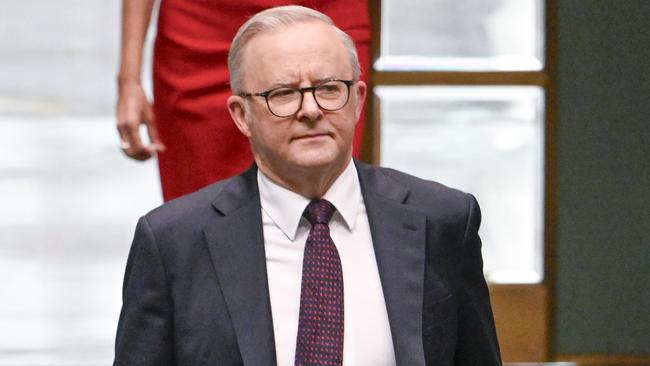
Anthony Albanese prefers to duck and weave. When faced with difficult questions, his first instinct is to obfuscate. Rather than making sense of complexity, his aim is to deny the media a sound bite.
The tactic is at the heart of the small target strategy that served Labor well at the last election but has been strained by the scrutiny of nearly three years in office.
It’s a particularly fraught one when it comes to international relations.
The Prime Minister danced for two days around Donald Trump’s crazy plan to “take over” Gaza, move the Palestinians out and turn it into the “Riviera” of the Middle East.
It’s an idea so ridiculous, not to mention illegal, that not one of Australia’s Jewish organisations endorsed it. Yet Albanese has looked flat-footed, admitting to taking a “sit back” approach to responding to Trump’s public comments because his positions can quickly change.
There’s no doubt Labor needs to tread carefully with Trump and his wider team. Just ask British Prime Minister Keir Starmer, who has faced a vicious online trolling campaign by Trump’s “First Buddy” Elon Musk.
Australia’s national security initiative AUKUS depends on White House support, and the government needs to avoid falling victim to Trump’s latest tariff whim, but sidestepping questions at home to stay on the President’s good side is unsustainable.
On Wednesday, Albanese was more intent on refusing to provide a running commentary on Trump’s remarks than on asserting Labor’s support for a two-state solution. The best he could do the following day was to concede the Trump plan was “different” to that advocated by Australia and most of the world.
Peter Dutton sounded more convincing, finding a way to cut through the noise of Trump’s America First rhetoric.
He praised the President as a “deal-maker” who was seeking to “leverage” countries in the region to step up and play their part in the reconstruction of Gaza. “People who dismiss President Trump and say that he’s not serious, or whatever derogatory comments they want to make, I just think it defies the reality of the gravitas he brings to the situation,” he said.
As predicted by Albanese, some of Trump’s most senior advisers have sought to walk back elements of the President’s plan.
Secretary of State Marco Rubio said the President was calling for only a temporary clear-out of Gaza to rebuild the territory, while special envoy to the Middle East Steve Witkoff told Republican senators Trump didn’t want to put US troops into Gaza, or spend US money on the reconstruction.
If Trump’s inner circle can provide a nuanced interpretation of their boss’s remarks, surely Albanese can. Viewing his public comments through an “art of the deal” lens is probably a good start.
Albanese has a standard response to questions on China (“We’ll agree where we can, disagree where we must, and engage in the national interest.”). Why not come up with a similar way of dealing with questions on Trump?
World leaders should also not be too shy to stand up for global norms, which look set to come under strain under Trump 2.0.
His unconventional policy ideas, including threats to seize Greenland and the Panama Canal, will increasingly give China cover for coercive behaviour in the international arena.
Albanese doesn’t need to call out Trump personally but he will always be on firm ground asserting our support for the rules-based order and international law.




Donald Trump is famous for “the weave” – his signature stream of consciousness ramblings.